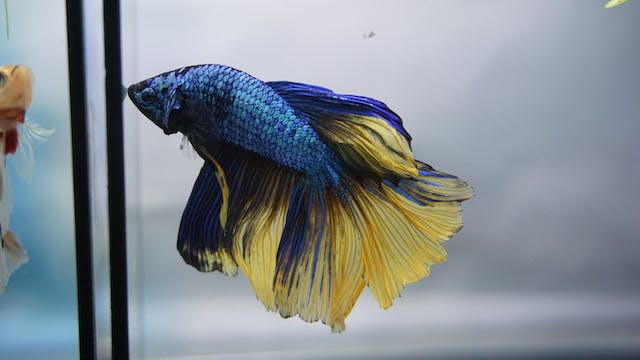Table of Contents
If you’re considering getting a betta fish, you might be wondering about their intelligence. Are betta fish smart? This is a common question among pet owners, and the answer is not so straightforward.
First of all, it’s important to define what we mean by “smart.” While betta fish may not be able to solve complex puzzles or perform tricks like a dog, they do have some surprising abilities. For example, bettas have excellent memories and can recognize individual people. They also have a keen sense of sight and can see colors that humans cannot.
So, are betta fish smart? The answer is yes, in their own way. While they may not be as intelligent as some other animals, they are still fascinating creatures with unique abilities. In this article, we’ll explore the topic of betta fish intelligence in more detail, looking at the latest research and what it means for pet owners.
Understanding Betta Fish Intelligence
Betta fish, commonly referred to as Siamese fighting fish, are well-liked pets recognized for their striking colors and distinctive personalities. A common query among betta fish owners is whether these fish possess intelligence. In this section, we will delve into the cognitive capabilities of betta fish and what we understand about their intellect.
Cognitive Abilities
Betta fish have been shown to possess some cognitive abilities, such as the ability to recognize patterns and shapes. In one study, betta fish were able to distinguish between different shapes and were even able to recognize their own reflection in a mirror. This suggests that betta fish have a certain level of visual intelligence.
Learning and Memory
Betta fish have also been shown to have a degree of learning and memory ability. They are able to learn from experience and can be trained to perform certain behaviors, such as jumping out of the water to grab food. Additionally, betta fish have been shown to remember the location of objects in their environment, which suggests that they have spatial memory.
Social Interaction
While betta fish are often kept alone in small tanks, they are actually social animals in the wild. They have been observed engaging in complex social interactions, such as courtship and territorial displays. In captivity, betta fish have been shown to recognize and respond to the presence of other fish, suggesting that they have some level of social intelligence.
Betta Fish Behavior and Personality
Betta fish, commonly referred to as Siamese fighting fish, are renowned for their vibrant colors and lengthy, flowing fins. Nevertheless, they are also recognized for their exceptional conduct and personality. In this section, we will explore some of the most common behaviors and personality traits of betta fish.
Aggression and Territoriality
Betta fish are known for their aggressive and territorial nature. Male bettas, in particular, are notorious for their fighting tendencies. They will often flare their gills and fins to intimidate other fish and protect their territory. It is important to note that bettas should never be kept in the same tank as other male bettas, as they will fight to the death.
Courtship and Breeding
Betta fish have a unique courtship ritual that involves the male building a bubble nest at the water’s surface. The male will then entice the female to mate by performing a dance-like display. Once the female lays her eggs, the male will collect them in his mouth and place them in the bubble nest. Betta fish breeding can be a complex process and requires a lot of knowledge and experience.
Interaction with Owners
Betta fish can be very interactive with their owners. They can recognize their owners and even learn to follow their movements. Some bettas will even “dance” for their owners by flaring their fins and swimming in circles. It is important to note that bettas require proper care and attention to thrive and live a long and healthy life.
Training Your Betta Fish
Betta fish are intelligent creatures and can be trained to perform tricks and swim through obstacle courses. Training your betta fish can be a fun and rewarding experience for both you and your fish. Here are some tips to help you get started.
Teaching Tricks
Betta fish can be taught to jump out of the water or perform other tricks such as swimming through hoops. To teach your betta fish to jump, you can use a small hoop or even a pen cap. Hold the hoop just above the water and encourage your fish to jump through it using a small piece of food as a reward. Repeat this process several times a day until your fish is comfortable jumping through the hoop.
Hand-Feeding
Hand-feeding your betta fish can help build trust and strengthen your bond with your fish. Start by holding a small piece of food between your fingers and placing it near the surface of the water. Your fish may be hesitant at first, but with patience and persistence, they will eventually come to your hand to eat.
Obstacle Courses
Creating an obstacle course for your betta fish can be a fun and challenging way to train them. You can use items such as small hoops, tunnels, and bridges to create a course for your fish to swim through. Start by introducing one obstacle at a time and rewarding your fish with a small piece of food each time they complete it. As your fish becomes more comfortable with the course, you can add more obstacles and increase the difficulty.
There are also training kits available that can help you train your betta fish. These kits typically include a variety of obstacles and instructions on how to train your fish. However, it is important to remember that every fish is unique and may respond differently to training.
Betta Fish Care for Mental Stimulation
If you want to keep your betta fish healthy and happy, mental stimulation is just as important as providing them with a clean tank and appropriate food. Here are some tips for providing mental stimulation for your betta fish.
Appropriate Habitat
The first step in providing mental stimulation for your betta fish is to make sure their habitat is appropriate. Bettas need a tank that is at least 5 gallons in size, with plenty of hiding places and plants for them to explore. A small tank can cause stress and boredom, which can lead to health problems.
Feeding and Diet
Feeding your betta fish a varied diet can also help with mental stimulation. In addition to their regular pellets or flakes, you can offer them frozen or live food like brine shrimp or bloodworms. This will give them a chance to hunt and explore, which can be mentally stimulating.
Social Behaviors
Betta fish are social creatures, and providing them with appropriate social interactions can also help with mental stimulation. However, it’s important to remember that not all bettas get along with each other. If you want to introduce another betta to your tank, make sure to do it slowly and carefully to avoid aggression.
Health and Lifespan of Betta Fish
While Betta fish are recognized for their brilliant hues and distinct personalities, it is crucial to comprehend their health and lifespan requirements to guarantee their contentment and well-being.
Physical Needs
Betta fish require a specific environment to thrive. They need a tank that is at least 5 gallons in size, with a heater to maintain a temperature between 76-82°F, and a filter to keep the water clean. Betta fish also need hiding places, such as plants or decorations, to reduce stress and provide a sense of security.
Emotional Needs
Betta fish have emotions and can feel stress, happiness, and other feelings. To keep your betta fish happy, you should avoid overfeeding, overstocking the tank, and sudden changes in their environment. Betta fish also enjoy having toys, such as mirrors or floating balls, to play with.
Veterinary Care
Betta fish require regular veterinary care to maintain their health. Signs of illness include lethargy, loss of appetite, and unusual behavior. It is important to find a veterinarian who is experienced with fish and can provide proper care. Betta fish also have an immune system, so it is important to maintain their water quality and avoid overcrowding to prevent diseases.
Overall, betta fish can live up to 3 years with proper care. By providing a suitable environment, addressing their emotional needs, and seeking veterinary care when necessary, you can help your betta fish live a happy and healthy life.







